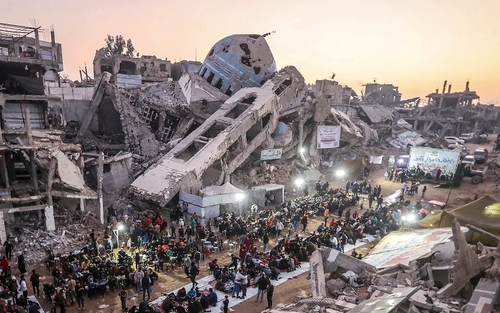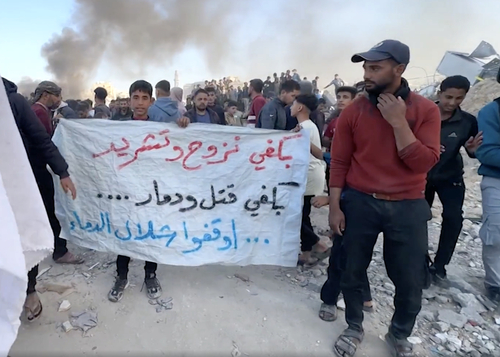Events
Starting on March 25, crowds of overwhelmingly young male Gazans have marched by the thousands through streets flanked by destroyed buildings, bellowing out slogans and carrying signs. Proceeding peacefully with uncovered faces in broad daylight, speaking angrily into close-up video cameras, they assail not Israel but Hamas, their jihadist overlords. If Jerusalem pays them attention, their protest could mark a positive turning point in the Palestinian-Israeli conflict.
 Anti-Hamas protestors marching among the ruins that Hamas brought upon them. |
This spontaneous, unforeseen event began with mourners at a funeral in the Beit Lahiya district of the Gaza Strip, then spread. Their slogans including the following, which I personally witnessed in videos:
- "Down with Hamas."
- "Hamas does not represent us."
- "Hamas get out."
- "Hamas is terrorism."
- "Hamas is terrorist"
- "Hamas rule has destroyed us."
- "Let Hamas go to hell."
- "Out, out, out, Hamas get out."
- "Stop the bloodshed."
- "Stop the war, we want to live."
- "We do not want to die."
- "We reject the rule of Hamas."
- "We want an end to the war."
- "We want to live in freedom."
- "We want to live in peace."
- "Yes to peace, yes to peace."
On occasion, demonstrators went beyond demanding to be rid of Hamas and made a specific policy demand: "The citizens here demand that [Hamas] release the [Israeli] prisoners." "Free the [Israeli] prisoners to end the war." (Note their purposefully not mentioning Israel's name.)
Hamas initially responded by deploying plainclothes personnel to intimidate and suppress the demonstrators. With time, it reacted more aggressively, calling the demonstrators "collaborators" and "traitors." Along with allied organizations, it condemned "these suspicious individuals [who] are as responsible as the [Israeli] occupation for the bloodshed of our people and will be treated accordingly."
 The late Odai Nasser al-Rubai, 22, tortured and murdered by Hamas. |
Hamas reportedly killed six critics, and notably Odai Nasser al-Rubai. He had announced publicly "I am done with this war," adding that Hamas "wants to shoot me." In response, Hamas abducted him, tortured him for four hours, tied him to the back of a car, dragged him through the streets, stabbed him repeatedly, and dumped his dying body at his family's house. Mourners accompanying his coffin yelled many slogans, prominently including "Hamas out, out, out," while his family called on "Almighty Allah to inflict suffering" upon his murderers and to punish them severely.
Reactions
In a joint statement, Gaza's powerful but usually cowed clan leaders called on Gazans to "launch a popular uprising" and for Hamas to "lift its hand from Gaza immediately." Hamas' Palestinian rival Fatah portentously instructed Hamas to "respond to the call of the Palestinian people in the Gaza Strip."
Moumen al-Natour, a former political prisoner of Hamas, expected celebrated the movement: "the anti-Hamas protesters alongside me in Gaza who are finally discovering their own voices after losing everything are, to me, among the bravest people on Earth."
Arab critics of Hamas did not hold back, with Saudi journalist Rashed al-Qahtani perhaps the most trenchant. Qahtani called Hamas violence against Gazans "despicable, horrifying and recurring. It is characterized by sadism, and constitutes an attempt to bring perdition, humiliation and dishonor."
Israeli authorities, unsurprisingly, welcomed the protests. "Hamas insists on taking you to hell, the solution is in your hands," they mass-texted Gazans. Addressing the "Residents of Gaza" on X, Israel's Defense Minister Israel Katz advised them to "Learn from the residents of Beit Lahiya. Just as they did, demand the removal of Hamas from Gaza."
Natour expected oppressed Gazans risking their lives to protest Hamas would dent the latter's international standing: "Some in the West will doubtless be confused to see Palestinians taking to the streets in Gaza and openly calling Hamas 'terrorists'." But those Westerners seemed distinctly not confused, for anti-Zionist monomaniacism meant, as U.S. Senator Bill Hagerty notes, ignoring events in Gaza : "No outrage from the pro-Hamas radical left in the United States and no reporting from mainstream media because it doesn't fit their narrative."
Australian Greens leader Adam Bandt spoke for many when he initially disregarded Hamas' persecution of Gazans and instead called on Canberra to respond with "pressure on the extremist Netanyahu government to end the occupation of Palestine, which is the root cause of the conflict, and end the invasion of Gaza." In this, Bandt echoed Al Jazeera, the Hamas propaganda network which protesters denounced by name. Protests? Sure, and they called for "an end to Israel's war of extermination against Gaza."
Causes
Anti-Hamas feelings among Gazans are hardly new. Even before Oct. 7, survey research and anecdotal evidence indicated that most of them despised their Hamas overlords. But the power and brutality of those overlords limited the expression of discontent to mutterings and emigration. Thus, an estimated 115,000 Gazans, or roughly 5 percent of the population, had left within eight months of Oct. 7.
Many more ache to join them. During the first half of March, a survey by Gallup International asked Gazans "Would you leave Gaza if given the opportunity?" Four percent would "send family abroad but [themselves] remain in Gaza," 38 percent "would leave temporarily but return in the future," and 14 percent "would leave permanently." Added up, that's 56 percent seeking escape of some sort. Even Khalil Shikaki, the Hamas-friendly director of a Palestinian polling firm, acknowledges that Hamas enjoys the support of only "close to one-third" of Gazans.
But why the eruption of protests now? For two principal reasons: In the words of an activist, "We have absolutely nothing to lose. We have lost everything already, so we are not afraid." Equally important, systematic Israeli incursions degraded Hamas' internal security forces. In two ways, then, did Israel create an opening for Gazans finally to express their loathing of Hamas.
 A typical anti-Hamas sign: "Enough of displacement and dispossession. Enough of killing and destruction. Stop the bloodletting. |
Suspicion
Most observers see the protests as grassroots, genuine, and important. Issa Karim, a dissident Gazan writer, reports that, "Before, many Gazans who wished to express anger against Hamas were unable to do so. The Palestinians are now feeling liberated and are united in saying one thing: 'Hamas out of Gaza'." Ohad Merlin of the Jerusalem Post concludes that "the fear barrier that prevailed in Gaza for 18 years of Hamas rule has been broken." Analysts at the Washington Institute for Near East Policy find the criticisms' "scale and boldness" unprecedented.
But the protests also spawned a suspicious response because, Merlin explains, "they were so rare and surprising that analysts had a hard time seeing them as spontaneous or authentic." Justin Amler of the Australia/Israel & Jewish Affairs Council cautions that there is no reason to believe that Gaza protestors suddenly embraced "values of peace, coexistence, and democracy." But some Gazans do speak, along with a law student, of "real peace between Palestinians and Israelis" and they deserve a chance to prove their sincerity.
Other skeptics go further, wondering if Hamas did not secretly connive with the protestors. Israeli journalist Zvi Yehezkeli suspects Hamas permitted them to show that it is not totalitarian, to draw out negotiations with Israel, and to gain intelligence on its opponents. Gatestone Institute author Bassam Tawil warns that we "not be fooled by the 'anti-Hamas' protests" and sees trickery: "this is the same Hamas that kept signaling to everyone, years before its terrorists attacked Israel on October 7, 2023, that it was not interested in another round of fighting." While skepticism is healthy, the videos bespeak a heartfelt earnestness and Hamas' murderous response confirms it.
Implications
Protests in Gaza have virtually no chance of overthrowing Hamas' elusive regime. However, they have potentially momentous implications for Israeli policy toward the strip – and therefore for the future of Gaza. The rallies vividly establish, at last, the existence of Gazans who despise Hamas. That is, they effectively announce the future staff of an Israeli-sponsored administration of the sort that Jerusalem called for a year ago: "Civil affairs and responsibility for public order will be based on local actors with 'management experience."
I call this a decent Gaza run by decent Gazans, where Israelis oversee an management and security force made up of Gazans, where Israel emulates neighboring Egypt in tolerating no challenge to its authority but otherwise leaves the population generally alone. Such a solution avoids two extremely unattractive alternatives: direct Israeli control or continued Hamas rule.
At least some Gazans understand the imperative to influence Israeli opinion. One protestor, a student at the Islamic University of Gaza, bemoans Israel's calling Gazans "animals" and hopes Israelis will stop saying "that seven million Palestinians are terrorists." He and they deserve a hearing in Jerusalem and beyond.
Mr. Pipes (DanielPipes.org, @DanielPipes) is founder of the Middle East Forum and author of the recently-published Israel Victory: How Zionists Win Acceptance and Palestinians Get Liberated (Wicked Son).
Apr. 6, 2025 update: Michael Greengard responded to the above article:
The people in the Gaza Strip were the ones who voted for Hamas in the first place.
As in Nazi Germany, there were no serious objections to the Hamas-run schools teaching anti-Semitism as a religion. As in Nazi Germany, there were no serious objections to all of Gaza's resources being devoted to aggressive wars and the kidnapping and murder of Jews.
The response among Gazans to Hamas's initial success on October 7, 2023 was wild popular enthusiasm.
Yes, I can believe that Hamas is not very popular at present. Hitler wasn't very popular in Germany in May 1945 either, but the only thing about Hamas that Gazans object to is that it lost the war. When the next Hamas comes along, they will support it.
There will be no peace with people like that - nor can there ever be. The only way to make real peace possible is either to move Gazans out of Gaza and far from Israel's borders or to put them in detoxification camps free of anti-Semitism for thirty years. Neither seems like a very practical proposition.
To which I reply:
Interesting that you should compare Hamas with the Nazis, as I call for an Israeli policy in Gaza comparable to the Allies' policy in post-1945 Germany.
Consider: in the aftermath of nearly six years of total war (four in the U.S. case) against the most vicious regime in all history, the Allies did not reduce the enemy territory to the Ice Age, did not force its population out, and did not rule it as severely as I counsel Israel to do in Gaza.
Instead, just four years after the cessation of fighting, the Allies permitted Germans to vote in fair elections to choose their own leaders. That proved a wise decision, as first West Germany and then united Germany have proven to be a good, stable, democratic ally for 75 years and counting. (I might note that government officials took these steps quite contrary to the scholarly consensus, which advocated such steps as allowing German couples to marry only on condition they agreed to the government raising their children.)
The same process, mutatis mutandis, took place in Austria, Italy, and Japan. It can work in Gaza too.
Apr. 7, 2025 update: I have started a blog, "Anti-Hamas Protests Persist," to continue coverage of this topic.